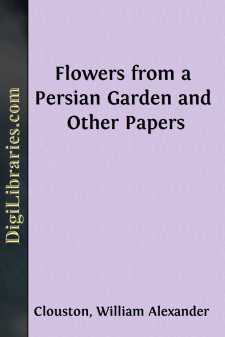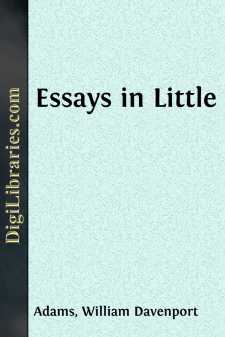Literary Criticism
- American 18
- Ancient and Classical 3
- Asian 1
- Australian & Oceanian 1
- Books & Reading 8
- Caribbean & Latin American 2
- Drama 2
- English, Irish, Scottish, Welsh 49
- European 7
- General 37
- Horror 1
- Humor 2
- Jewish 2
- Medieval 2
- Middle Eastern 3
- Poetry 7
- Renaissance 6
- Russian & Former Soviet Union 1
- Shakespeare 27
Literary Criticism Books
Sort by:
The Problem of a Preface A peculiar difficulty arrests the writer of this rough study at the very start. Many people know Mr. Bernard Shaw chiefly as a man who would write a very long preface even to a very short play. And there is truth in the idea; he is indeed a very prefatory sort of person. He always gives the explanation before the incident; but so, for the matter of that, does the Gospel of St....
more...
by:
Julius West
INTRODUCTORYThehabit, to which we are so much addicted, of writing books about other people who have written books, will probably be a source of intense discomfort to its practitioners in the twenty-first century. Like the rest of their kind, they will pin their ambition to the possibility of indulging in epigram at the expense of their contemporaries. In order to lead up to the achievement of this...
more...
DEDICATION. MY DEAR WILLIAM ARCHER, Severe and ruthlessly honest man that you are, you will find that the levities and the gravities of this book do not accord, and will say so. I plead only that they were written at intervals, and in part for recreation, during years in which their author has striven to maintain a cheerful mind while a popular philosophy which he believed to be cheap took possession...
more...
I SKETCH OF THE LIFE OF THE PERSIAN POET SAADI—CHARACTER OF HIS WRITINGS—THE “GULISTÁN”—PREFACES TO BOOKS—PREFACE TO THE “GULISTÁN”—EASTERN POETS IN PRAISE OF SPRINGTIDE. It is remarkable how very little the average general reader knows regarding the great Persian poet SaádÐÑ and his writings. His name is perhaps more or less familiar to casual readers from its being...
more...
by:
Arthur Symons
SAINT AUGUSTINE The Confessions of St. Augustine are the first autobiography, and they have this to distinguish them from all other autobiographies, that they are addressed directly to God. Rousseau's unburdening of himself is the last, most effectual manifestation of that nervous, defiant consciousness of other people which haunted him all his life. He felt that all the men and women whom he...
more...
by:
Mark Twain
It seems to me that it was far from right for the Professor of English Literature in Yale, the Professor of English Literature in Columbia, and Wilkie Collins to deliver opinions on Cooper's literature without having read some of it. It would have been much more decorous to keep silent and let persons talk who have read Cooper. Cooper's art has some defects. In one place in...
more...
BJÖRNSTJERNE BJÖRNSON I Björnstjerne Björnson is the first Norwegian poet who can in any sense be called national. The national genius, with its limitations as well as its virtues, has found its living embodiment in him. Whenever he opens his mouth it is as if the nation itself were speaking. If he writes a little song, hardly a year elapses before its phrases have passed into the common speech of...
more...
ALEXANDRE DUMAS Alexandre Dumas is a writer, and his life is a topic, of which his devotees never weary. Indeed, one lifetime is not long enough wherein to tire of them. The long days and years of Hilpa and Shalum, in Addison—the antediluvian age, when a picnic lasted for half a century and a courtship for two hundred years, might have sufficed for an exhaustive study of Dumas. No such study...
more...
INTRODUCTION THE KINDS OF CRITICISM It is probably unnecessary, and might possibly be impertinent, to renew here at any length the old debate between reviewers as reviewers, and reviewers as authors—the debate whether the reissue of work contributed to periodicals is desirable or not. The plea that half the best prose literature of this century would be inaccessible if the practice had been...
more...
by:
Walter Pater
[3] THE making of an anthology of English prose is what must have occurred to many of its students, by way of pleasure to themselves, or of profit to other persons. Such an anthology, the compass and variety of our prose literature being considered, might well follow exclusively some special line of interest in it; exhibiting, for instance, what is so obviously striking, its imaginative power, or its...
more...











